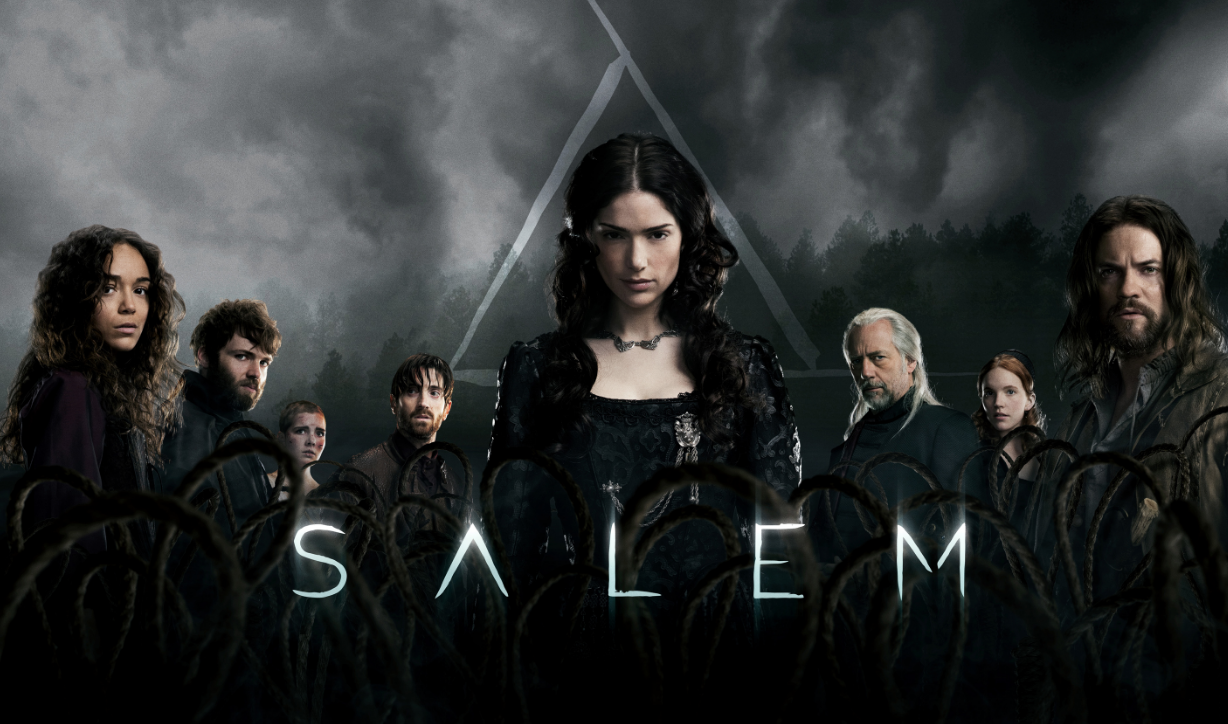BY JOANNA C. VALENTE
A lot of people don't like to admit the "bad" art or music or movies or TV shows they enjoy. I personally don't care (because entertainment is entertainment and we all need to take a break sometimes). One of mine is the Netflix show "Salem," a show that was cancelled after three seasons, airing its last episode in January 2017 after starting in 2014.
While it's not altogether surprising that I would want to check out a show about witches, particularly a fictionalized version of the Salem witch trials, I continued to watch it, despite the fact that it was definitely cheesy more often than not.
So, why? Well, it explored racism and sexism in a way that surprised me, and in a more sophisticated way than many horror shows usually do. American Horror Story, for instance, has been hit and miss for me (there were some things to love about the "Coven" season when it came to feminism, and some necessary transgender/LGBTQ themes during "Hotel," but there's also been a lot of failures, too).
The show, for instance, is deeply centered around women, particularly, how women had very little choice, a truth the show openly talks about. Mary Sibley, for instance, becomes pregnant while the baby's father goes off to war, leaving her with little choice but to get rid of the child via witchcraft. Mary ends up becoming so powerful, she controls Salem (through her witchcraft and pragmatic marriage to a rich older dude who is a huge jerk). Sure, she could have had the baby, but single moms with no income were essentially pitted to an alienating life forever, not to mention one of eternal struggle.
In this way, she's the anti-heroine who is selfish and manipulative, an easy person to dislike, but it's hard not to empathize even a little, considering she has been forced to make terrible choices, because women didn't have many choices. If at all, in the grand scheme.
It's not just about Mary though. Anne Hane, Mercy Lewis, and Tituba are the three other female characters the show explores the themes of racism, sexism, power, and choice through. All the characters have choices, even if they are limited - but within a confining context.
While it could be argued that Mary, for instance, didn't have much of a choice but to manipulate and antagonize the other women in Salem in order to retain her power and control, she does. She abuses Mercy and Tituba, using them as her puppets and minions. In this way, she is as much of an abuser as the men in Salem are, unable to understand how to truly liberate her fellow women.
In this way, it's not surprising when Mercy follows Mary's steps, taking over the brothel as a safe haven for girls, which is truly at once a safe haven, helping the girls in Salem who are abused by their fathers and husbands, or otherwise abandoned.
RELATED: The 20 Best TV Intros of All Time
However, of course, she does this for a price (aka, blood). Like Mary. Anne, who is initially innocent at the start of the show, does the same when she discovers her powers, and finds way to overpower everyone, including Mary. Anne's complete control is both surprising, but also a gratifying end, proving that women don't need to be saved. Or want to be.
The show illustrates what oppression really does to people, to good people who normally would not choose the lesser, more selfish path. What happens to those trapped in the middle and at the bottom?
It's really Tituba who is the most compelling character in the series (also based on a real person, one of the first women to be accused of witchcraft during the hysteria of 1692), however, because she's a woman of color, who was stolen and forced into slavery. The show even went so far as to include the scene where she is tortured and questioned (because, historically, this is how you figured out if someone was a witch...), and the scene was horrifying and terrifying. What was done to her was gruesome - as is still the reality for women of color.
Was the gratuity needed (and really, is it ever)? Probably not. In some way, though, it does seem as if the show wanted to emphasize the pain Tituba felt her entire life, being sold into slavery by white men, seeing her family members raped, being raped by white men herself. And Mather, the man torturing her, is just further evidence of the hands of oppression.
While this isn't exactly news, most mainstream TV shows never seem to include the plight, persecution, oppression, and isolation of women of color, especially in the past. For many viewers, Tituba's storyline makes the show worth watching, as do all the women, even if the historical accuracy isn't exactly what I would have wanted (there were so many angles the show could have taken that it didn't, many missed opportunities for sure).
Joanna C. Valente is a human who lives in Brooklyn, New York, and is the author of Sirs & Madams (Aldrich Press, 2014), The Gods Are Dead (Deadly Chaps Press, 2015), Marys of the Sea (The Operating System, 2017), Xenos (Agape Editions, 2016) and the editor of A Shadow Map: An Anthology by Survivors of Sexual Assault (CCM, 2017). Joanna received a MFA in writing at Sarah Lawrence College, and is also the founder of Yes, Poetry, a managing editor for Luna Luna Magazine and CCM, as well as an instructor at Brooklyn Poets. Some of their writing has appeared, or is forthcoming, in Brooklyn Magazine, Prelude, Apogee, Spork, The Feminist Wire, BUST, and elsewhere.































